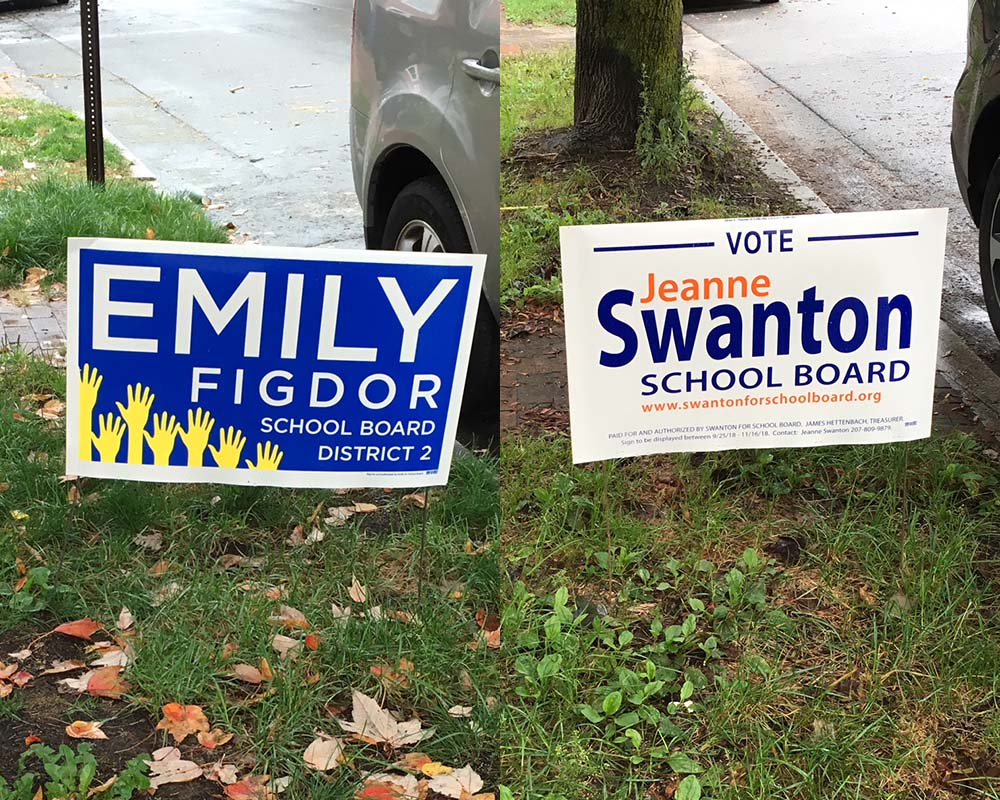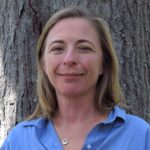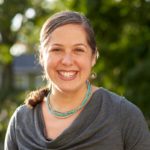PORTLAND SCHOOL BOARD ELECTION
Neighborhood School Advocates Seek Open Seat
By Tony Zeli, Publisher & Editor
District 2 Board of Public Education member Holly Seeliger will not seek a third term. That leaves an open seat to represent the West End, Western Prom, Parkside, St. John Valley, and Oakdale/USM neighborhoods for the next three years. Competing for the opportunity are two leaders from the four-school renovation referendum campaign: Emily Figdor and Jeanne Swanton.
In separate interviews, both candidates were asked the same questions.
BACKGROUND
Please share your relevant background and experience. What in your background has prepared you for the budgeting process and the task of weighing the competing demands of our diverse school population?
Emily Figdor discusses her 20-year career as a professional organizer and political advocate with experience at every level of government.
“I feel very well equipped to come to the school board and be able to really be a leader in solving some of the challenges that we face in the school district,” she says.
Also, Figdor describes her past success in organizing the community around school issues: such as the school renovation referendum and fighting against cuts to the school budget earlier this year. But her first organizing on school issues was in 2015.
“My daughter was in second grade and she had 27 kids in her class, and she had totally lost her love of learning,” says Figdor. She realized it was a problem that she had the skills to face. So, she campaigned to get two new teachers at Reiche Elementary and one at Riverton.
On the topic of budgets, Figdor says she has experience overseeing the budget process for nonprofits. She notes the challenges with the budget are shrinking state funding and unreceptive city councilors. The solution she says is to educate the public and city councilors on the Portland Promise, the school district’s comprehensive plan. If the public supports the plan, then councilors will put the resources behind it.
Jeanne Swanton discusses her deep involvement in Portland schools. She has been involved with the Reiche Parent Teacher Organization since 2009.
In fact, Swanton was part of the evolution of Reiche as it became the first teacher-led elementary school in Maine. She was also a leader in the campaign to renovate four schools.
“I’ve created a lot of relationships, some really strong relationships with school board members… They are supporting me because they realize that we can work together. And I think that is what we really need right now… I think all this hostility and divisiveness has really taken its course. And we really need to stop it. I don’t think we are as productive. We can’t solve the problems we need to solve if we continue like this.”
Swanton has a degree in economics from NYU and MBA from Fordham. She currently works with small businesses and helps them with their books.
“The School Budget of course is a little bit different, but I understand how things need to fit,” Swanton says.
RIGHT-SIZING
Does Portland have too many schools? As decision-makers consider gaps in funding, they have once again turned to the idea of “rightsizing” the district. Is this inevitable? What could this mean for our neighborhood schools? And who will be most impacted?
“I am passionate about our neighborhood schools,” says Jeanne Swanton, “I think that is one of the best things about living in Portland – being able to walk to our schools is so special.”
She laments that the topic of rightsizing has been coming up for so many years, and that the district has spent so much money studying it. Each time it comes up, it divides the community. “This time, when we do the reporting again, spend another 180,000 dollars, I think we owe it to the community to really investigate, research, and make a decision,” Swanton tells us.
Swanton supports neighborhood schools, but admits it is time to look deep and make hard decisions. It is an important conversation to have because, she says, everybody would be impacted by consolidation. Those with kids, and those without. The taxpayers. Everybody. But it cannot be an issue that is held over people’s heads every few years.
Emily Figdor says consolidation is not a good solution. She says consolidating schools leads to worse student outcomes, less family involvement, and less satisfaction among school staff.
“Our Neighborhood schools are core to what people across the city love about our schools,” says Figdor.
The data she believes demonstrate that Portland has the right number of schools. “Comparing (Portland) to other communities, we don’t have too many schools,” she says.
To that end, Figdor discusses her involvement on the committee overseeing the renovations at four schools. Renovations have begun at Lyseth Elementary, but Figdor says she will be advocating to make sure none of the other three schools are left behind.
ADULT ED
According to the Portland Public Schools District Fact Sheet there were over 4,500 adult education students in the last academic year. Adults are about 40% of the overall student population. What do you see as Portland’s priorities for educating adult students?
Both Emily Figdor and Jeanne Swanton agree that adult education has not received the attention it deserves.
Figdor says her starting point “would be really valuing adult education and knowing that it is critical to the city’s economic success.”
She points to efforts to raise pay for adult ed teaching staff. In the end, the intended increases were greatly reduced through the budgeting process. This is an example of the lack of attention the program receives. Unfortunately, adult ed always seems to be on the political chopping block, she says.
Figdor admits she could learn more about specific adult education programs, but knows its value to the immigrant population, those is career transitions, and others who are looking to gain new skills and find job opportunities.
Jeanne Swanton says adult education is too often an after-thought. Adult literacy is a big issue, she says. Swanton has tutored adults in English language and knows first-hand what a valuable resource adult education is.
Swanton applauds the efforts of others, and she mentions Councilor Pious Ali’s work in particular. She thinks one good idea is to work with the community to identify occupational needs and develop programs to meet those needs.
“A lot of times taxpayers feel upset because they support kids and education. They realize that it builds community and makes their community better. But (adults) also need to have access to schools and education,” Swanton says.
HUMAN RIGHTS
Increasingly, human rights issues come before the Board of Public Education. Immigrant students, transgender students, students who are homeless, are just some of those working for their rights. What role should the School Board play in rights-based movements? What role do you see yourself playing?
Jeanne Swanton has been impressed with the school board’s work on rights, especially so in the last couple years. If it is represented in the community, she says, then it needs to be recognized by the school board through policies.
“We need to make sure that people are welcomed and received, and everyone has the same equal footing, and everyone is respected,” says Swanton. As an individual, Swanton supports everyone’s right to come to the table, and believes all should be respected and valued. She would support any policies that furthered those ideals.
Swanton has a passion to help children who are housing insecure. She recounts a statistic that at any given time there are one to two students who are homeless attending Reiche Elementary. She wonders who is making sure they are recognized and given support.
Emily Figdor also admires the current work being done on student rights. In particular she notes Superintendent Xavier Botana’s approach to students as “whole people.”
Figdor looks to the achievement gap as an important indicator of trouble in the district. Children living in poverty and children of color are being left behind in Portland schools. Her approach is universal access to high-quality pre-kindergarten. According to Figdor, research shows that access to pre-k is a powerful tool for later success both socially and academically. She would make universal pre-k a priority and work to build the public support needed to make it happen.
 “School needs to be a safe space, where children learn about their rights and gain the skills to speak out for themselves and others,” says Figdor. As an individual, she would very much like the opportunity to facilitate and support all students, be receptive to issues that come forward, and be proactive in addressing student needs.
“School needs to be a safe space, where children learn about their rights and gain the skills to speak out for themselves and others,” says Figdor. As an individual, she would very much like the opportunity to facilitate and support all students, be receptive to issues that come forward, and be proactive in addressing student needs.
FIND YOUR POLLING PLACE
The election will be held on Tuesday, November 6th, 2018. Polls open at 7 a.m. and close at 8 p.m. To find your polling place, visit https://www.portlandmaine.gov/1117/polling-places.








